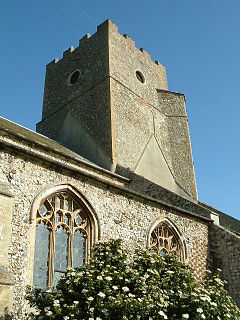Heacham
| Heacham | |
|---|---|
 Heacham Church |
|
| Heacham shown within Norfolk | |
| Area | 17.66 km2 (6.82 sq mi) |
| Population | 4,750 (2011 census |
| • Density | 269/km2 (700/sq mi) |
| OS grid reference | TF675372 |
| District | |
| Shire county | |
| Region | |
| Country | England |
| Sovereign state | United Kingdom |
| Post town | KING'S LYNN |
| Postcode district | PE31 |
| Police | Norfolk |
| Fire | Norfolk |
| Ambulance | East of England |
| EU Parliament | East of England |
| UK Parliament | |
Heacham (52°54′25″N 00°29′24″E / 52.90694°N 0.49000°E) is a town in West Norfolk, England, located beside The Wash, between King's Lynn, 14 miles (23 km) to the south and Hunstanton, about 3 miles (4.8 km) to the north. It has been a seaside resort for a century and a half.
There is evidence of settlement in the Heacham area for around the last 5,000 years, with numerous Neolithic and later Bronze Age finds throughout the parish. This is presumably because the local geology consists of primarily cretaceous sands and underlying chalk, meaning that there is very little surface water for miles in any direction. This can also be seen along the banks of the Caudle Carr located just outside Dersingham, where numerous archaeological sites have been found. Running water in conjunction with the fertile surrounding lands made Heacham an ideal settling location for early man. Evidence of habitation continues through the Iron age into the Romano-British era. But the beginnings of the present village most probably did not occur until around the 5th century, with the Anglo-Saxon invasion and the beginnings of present-day East Anglia.
The name of the village purportedly derives from a 12th-century Norman lord, Geoffrey de Hecham. Although this is possible, it is unlikely as the name 'de Hecham' literally means 'of Hecham', implying the place name was already in existence. The name Hecham was noted in the Little Domesday Book which was written around 1086 as part of the Smithdon hundred (Smetheduna). Prior to the Norman Conquest, Heacham was controlled by two Saxons, Alnoth, and Toki the king's thegn whose estates were based around his hall in Castle Acre. After the conquest the lands passed to William de Warenne and his brother-in-law Frederick de Warenne, who was later killed by Hereward the Wake.
...
Wikipedia

